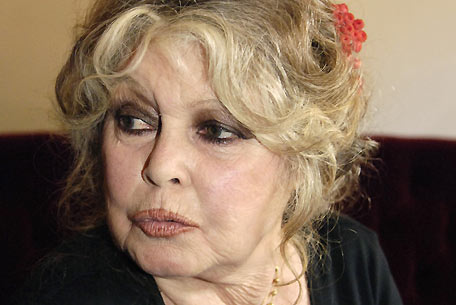 A French court has fined former film star Brigitte Bardot 15,000 euros (£12,000) for inciting racial hatred. She was prosecuted over a letter published on her website that complained Muslims were “destroying our country by imposing their ways”. It is the fifth time Ms Bardot been convicted over her controversial remarks about Islam and its followers. This is her heaviest fine so far.
A French court has fined former film star Brigitte Bardot 15,000 euros (£12,000) for inciting racial hatred. She was prosecuted over a letter published on her website that complained Muslims were “destroying our country by imposing their ways”. It is the fifth time Ms Bardot been convicted over her controversial remarks about Islam and its followers. This is her heaviest fine so far.
Category Archives: France
France arrests 8 over mosque attack
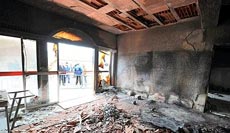 French police have arrested eight people, including several soldiers, over an arson attack on a mosque in southwestern France.
French police have arrested eight people, including several soldiers, over an arson attack on a mosque in southwestern France.
The suspects, aged 18 to 30, were taken into custody Wednesday for questioning over the April 20 attack in Colomier near the city of Toulouse, in which arsonists started a fire in the mosque entrance and trashed a next-door prayer room.
The arrests took place near the cities of Toulouse, Castres and Carcassonne, where two soldiers were reportedly detained at their barracks, AFP quoted local newspaper La Depeche du Midi as saying. State prosecutor Michel Valet said it was “too soon to say” if the suspects had links to extreme-right groups.
The racism behind integration
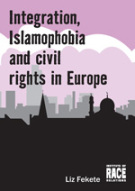 “In most European countries, integration is simply a euphemism for assimilation, the report says. The driving force is the notion of a national culture. In Germany this expresses itself through blood-based citizenship and a Leitkultur(dominant culture) and in France through citizenship by birth and earth and by laïcité (secularism). Norway has the idea of likhet (sameness); the Netherlands has verzuiling (religious/cultural blocs).
“In most European countries, integration is simply a euphemism for assimilation, the report says. The driving force is the notion of a national culture. In Germany this expresses itself through blood-based citizenship and a Leitkultur(dominant culture) and in France through citizenship by birth and earth and by laïcité (secularism). Norway has the idea of likhet (sameness); the Netherlands has verzuiling (religious/cultural blocs).
“One expects the extreme right to embrace such notions, but the report finds centre-left parties also using these racist sentiments to strategise. They may be liberal about immigration but, when it comes to Muslims, they fall prey to an Islamophobia that is ‘nourished by a mixture of feminism and secularism’.”
Ziauddin Sardar reviews Liz Fekete’s Integration, Islamophobia and civil rights in Europe, a new report published by the Institute of Race Relations.
Sarkozy takes stand against far right anti-Muslim bigotry (not)
“Brigitte Bardot is facing prison if convicted for a fifth time of inciting racial hatred. Brigitte loves animals and hates Muslims, which is why she sent a petition to the president about halal butchers: ‘I’ve had enough of being led by the nose by this whole population which is destroying us, destroying our country, imposing their ways.’ Sarkozy takes a tough line on this sort of abuse. ‘When you live in France’, he is fond of reminding voters, ‘you respect the rules. You don’t have lots of wives, you don’t circumcise your daughters, and you don’t use the bath of your apartment to slaughter sheep in.’ The peace prize is in the post, M President.”
Fiachra Gibbons in the Guardian Paris Diary, 6 May 2008
Europe’s debt to Islam given a skeptical look
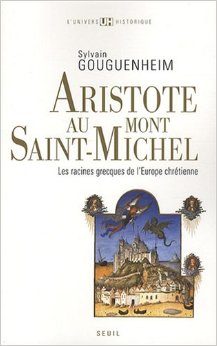 When Sylvain Gouguenheim looks at today’s historical vision of the history of the West and Islam, he sees a notion, accepted as fact, that the Muslim world was at the source of the Christian Europe’s reawakening from the Middle Ages.
When Sylvain Gouguenheim looks at today’s historical vision of the history of the West and Islam, he sees a notion, accepted as fact, that the Muslim world was at the source of the Christian Europe’s reawakening from the Middle Ages.
He sees a portrayal of an enlightened Islam, transmitting westward the knowledge of the ancient Greeks through Arab translators and opening the path in Europe to mathematics, medicine, astronomy and philosophy – a gift the West regards with insufficient esteem.
In a new book, he is basically canceling, or largely writing off, a debt to “the Arabo-Muslim world” dating from the year 750 – a concept built up by other historians over the past 50 years – that has Europe owing Islam for an essential part of its identity.
“Aristote au Mont Saint-Michel” (Editions du Seuil), while not contending there is an ongoing clash of civilizations, makes the case that Islam was impermeable to much of Greek thought, that the Arab world’s initial translations of it to Latin were not so much the work of “Islam” but of Aramaeans and Christian Arabs, and that a wave of translations of Aristotle began at the Mont Saint-Michel monastery in France 50 years before Arab versions of the same texts appeared in Moorish Spain.
Le Figaro and Le Monde, in considering the book in prominent reviews, drank its content in a single gulp. No suspended endorsements or anything that read like a caution.
“Congratulations,” Le Figaro wrote. “Mr. Gouguenheim wasn’t afraid to remind us that there was a medieval Christian crucible, a fruit of the heritage of Athens and Jerusalem,” while “Islam hardly proposed its knowledge to Westerners.”
Le Monde was even more receptive: “All in all, and contrary to what’s been repeated in a crescendo since the 1960s, European culture in its history and development shouldn’t be owing a whole lot to Islam. In any case, nothing essential. Precise and well-argued, this book, which sets history straight, is also a strongly courageous one.”
Published less than a month ago, the book is just beginning to encounter learned criticism. Sarcastically, Gabriel Martinez-Gros, a professor of medieval history, and Julien Loiseau, a lecturer, described Gouguenheim as “re-establishing the real hierarchy of civilizations.”
They said that he disregarded the mathematics and astronomy produced by the Islamic world between the 9th and 13th centuries and painted the period’s Islamic civilization exactly what it was not: obscurantist, legalistic, fatalistic and fanatic.
Who burned Toulouse mosque?
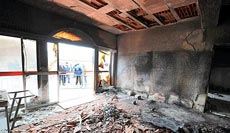 Muslims in the southwest city of Toulouse woke up on Monday, April 21, to the sad view of a burned local mosque, but were divided on the possible arsonists.
Muslims in the southwest city of Toulouse woke up on Monday, April 21, to the sad view of a burned local mosque, but were divided on the possible arsonists.
“This is very shocking,” Abdul Nabi al-Hamrawi, the imam of Al-Salam Mosque, told IslamOnline.net. “We have no idea how or why this happened. We have no problems whatsoever with any of our neighbors.”
The mosque, located in the Toulouse suburb of Colomiers, was set ablaze on Sunday, April 20. Officials say a dozen firefighters quickly put out the fire, but only after it had gutted the inside of the mosque.
Investigators and rescue officials quickly concluded it was a deliberate act of arson. They say the fire broke out after a garbage can was set alight inside the Muslim place of worship. The attackers were thought to have entered the mosque through yanking its doors open.
Interior Minister Michele Alliot-Marie called the attack an “odious act” and vowed to apprehend the culprits. “All efforts will be exerted to indentify the perpetrators and bring them to justice.”
Local Muslims gave different scenarios about who could have attacked the mosque, inaugurated in 2006 to serve the city’s Muslim community.
“This is open to all possibilities,” Abdul Qader bin Ganna, the Union of French Islamic Organizations (UOIF) official in Toulouse, told IOL. “It could be Islamophobia, but an inter-Muslim dispute could not be ruled out also.”
Ganna cited recent frictions involving different groups of Muslims, mainly from Moroccan origin, regarding control over the city mosques. “Some of them even traded punches inside Al-Salam Mosque,” he recalled. The Muslim activist also notes that the mosque lies in a small industrial area. “There were never complaints of hostilities with non-Muslim residents.”
But Ammar Muakkran, a Muslim resident, believes the arson attack was Islamophobic. He sees a link with the recent desecration of 148 Muslim graves in Notre Dame de Lorette cemetery, France’s biggest war cemetery, earlier this month. Muakkran suspects both attacks were the work of far-right extremists.
Islamophobic attacks have recently surged in France, home to a sizable Muslim minority of nearly seven million. The cemetery desecration was the second in a year. Last week, a mosque in the city of Besancon was defaced by racist and neo-Nazi graffiti.
Boy called Islam ‘banned from game show over name’
The parents of a nine-year old French boy called Islam are to sue a television company for discrimination after it allegedly refused to let him participate in a game show unless he changed his name. Angel Productions told the boy that his name “represented a religion that was not liked in France,” according to the parents cited by Le Parisien newspaper.
Islam Alaouchiche had been shortlisted for a place in a youth game show called “In ze boite” (In the box) on Gulli, a children’s channel. But when he turned up for the final audition with his parents, who have Algerian nationality, they were told by a casting agent: “There’s a problem, your son cannot keep his first name. Being called Islam if you are a boy is like a girl wearing the (Islamic) veil.” The woman suggested Islam use “another Arab name” such as Mohammed or Sofiane. But his mother Farah refused.
The family left the premises to return to their home near Paris and never heard from the company again.
Brigitte Bardot on trial for Muslim slur
PARIS — French former film star Brigitte Bardot went on trial on Tuesday for insulting Muslims, the fifth time she has faced the charge of “inciting racial hatred” over her controversial remarks about Islam and its followers.
Prosecutors asked that the Paris court hand the 73-year-old former sex symbol a two-month suspended prison sentence and fine her 15,000 euros (12,071 pounds) for saying the Muslim community was “destroying our country and imposing its acts”.
Since retiring from the film industry in the 1970s, Bardot has become a prominent animal rights activist but she has also courted controversy by denouncing Muslim traditions and immigration from predominantly Muslim countries. She has been fined four times for inciting racial hatred since 1997, at first 1,500 euros and most recently 5,000. Prosecutor Anne de Fontette told the court she was seeking a tougher sentence than usual, adding: “I am a little tired of prosecuting Mrs Bardot.”
French anti-racist groups complained last year about comments Bardot made about the Muslim feast of Eid al-Adha in a letter to President Nicolas Sarkozy that was later published by her foundation. “I am fed up with being under the thumb of this population which is destroying us, destroying our country and imposing its acts,” the star of ‘And God created woman’ and ‘Contempt’ said.
Bardot has previously said France is being invaded by sheep-slaughtering Muslims and published a book attacking gays, immigrants and the unemployed, in which she also lamented the “Islamisation of France”.
Muslim war graves defaced in France
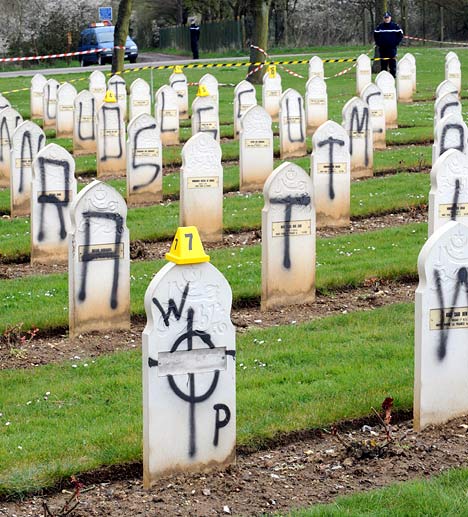 Up to 148 Muslim graves in France’s World War I cemetery have been desecrated in an incident that has drawn strong condemnation from the country’s president.
Up to 148 Muslim graves in France’s World War I cemetery have been desecrated in an incident that has drawn strong condemnation from the country’s president.
A pig’s head was hung from one of the several tombstones targeted by vandals who also wrote slogans insulting France’s Muslim justice minister, officials said on Sunday.
Describing Saturday’s incident, Jean-Pierre Valensi, the state prosecutor for Arras, said “the slogans directly target Islam and they gravely insult Rachida Dati, the justice minister”, who is the daughter of North African immigrants.
The Notre Dame de Lorette cemetery, in the northern town of Arras, commemorates the victims of a series of long and bloody battles for control of northern France at the start of World War I. Inaugurated in 1925, the cemetery houses the remains of some 40,000 soldiers, half of them in named graves.
The Muslim quarter includes 576 tombs, grouped together and turned towards Mecca. Saturday’s attack targeted this section of the cemetery.
French official dismissed over resistance to Muslim school
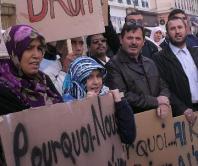 The French government dismissed a top regional education official Wednesday for vigorously opposing a new Muslim school and publicly complaining about pressure from Paris to stop obstructing its opening.
The French government dismissed a top regional education official Wednesday for vigorously opposing a new Muslim school and publicly complaining about pressure from Paris to stop obstructing its opening.
The Al-Kindi high school, in a suburb of Lyon in eastern France, finally admitted its first 22 pupils on March 5 after an eight-month struggle with Alain Morvan, the head of the school board. The struggle ended only when Paris intervened to permit the school to open.
A government spokesman, Jean-François Copé, said Morvan was replaced because “his behavior was not that of a senior official, whose task is to carry out government policy.”
Morvan’s stubborn campaign had become a sore point for French Muslims, and they accused him of Islamophobia for refusing them the right to begin a religious school although about one-fifth of all high schools in France are private, mostly Catholic.
In rejecting three requests to open the school, Morvan accused its founders of being “fundamentalists” and said he would sign refusals to open it “down to the last drop of ink.”
